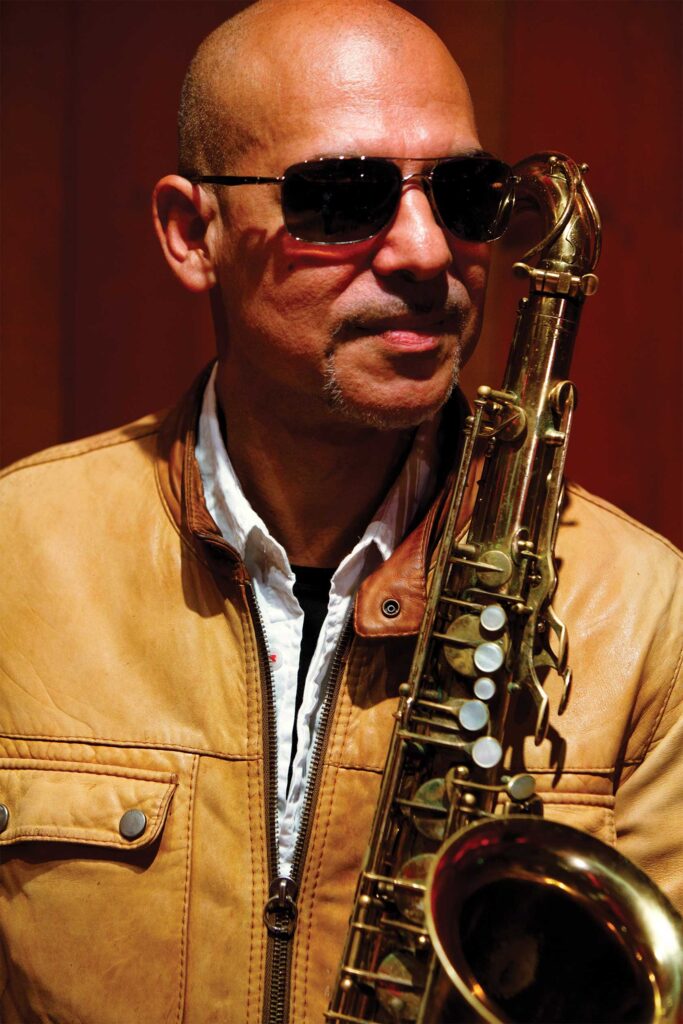Saxophonist, composer Jacques Schwarz-Bart blends cultural rhythms and ritual in ‘The Harlem Suite’

“The Harlem Suite” is the latest album (released March 31 on the Ropeadope label) from Jacques Schwarz-Bart, Berklee professor, saxophonist and composer. Based in Manhattan, in Boston to teach, and hailing from Guadeloupe and France, Schwarz-Bart’s music has both originality and deeply historical narratives. He comes by it honestly: His mother Simone Schwarz-Bart is among the 20th century’s great Caribbean and feminist writers; his father Andre was the author of a vital novel about the Holocaust. Andre’s parents were deported and murdered in Auschwitz. You don’t hear nostalgia or sadness in Jacques Schwarz-Bart’s compositions, which adds to their greatness. Instead, he creates music that encapsulates the resilience and complexity of the Black experience in the Caribbean and the U.S. The Banner caught up with Schwarz-Bart from his home in NYC.
Tell us about the new album. You composed seven of the songs; three are jazz standards that you arranged.
The album reflects the variety of Black music that I have had the honor of playing next to some great musicians: Roy Hargrove, D’Angelo, Erykah Badu. It is modern jazz, but it has a lot of variety, including neo-soul and Caribbean rhythms. The song “Ambrosia,” is dedicated to [the late] Roy Hargrove: it has a slow, funky beat, the sort that Roy liked to play.
On the album are a number of illustrious musicians, including pianist Sullivan Fortner, drummer Terri Lyne Carrington and vocalist Stephanie McKay. How did their approaches contribute to the music?
The music is always very melodically rhythmic and lyrical. Sullivan is one who pushed melodic exploration to the extreme. Stephanie is one of the most recognized and unique voices in today’s world stage. The timbre of her voice has a resonance that soars over any type of accompaniment; either you have it, or you don’t! These are the overtones she was born with, you can’t practice it. And Terri Lyne easily navigates music from rhythm to swing to neo-soul to funky.
Malika Tirolien is also on the album providing vocals. Like yourself, she has roots in Guadeloupe. How did that collaboration come about?
Malika is featured on the entirety of my previous album, “Soné Ka-La Odyssey 2.” We have a long, strong collaboration going on eight or nine years. She’s also the daughter of a close childhood friend. And lives in Montreal, which isn’t that far away.
Speaking of the Caribbean, you are credited with creating Gwoka jazz and Voodoo jazz. Can you explain what those forms are?
Gwoka jazz is a style of music from Guadeloupe. It’s also the name of the instrument, a type of drum we created to play the music. Gwoka jazz is directly inspired by African music and has seven fundamental rhythms. It also has a style of singing that is very similar to what you find in African-American music: the Blues. So it was not a big step to create a style to connect the two musical traditions. Voodoo jazz is rooted in both Voodoo rhythms and chants from Haiti. I’m lucky enough to have been steeped in Voodoo musical traditions as a child: it’s part of the wealth of culture I inherited. And coming to New York, I was surrounded by Haitian culture, and privileged to know this as well.
Spirituality is important to your work. You are quoted in The Guardian in 2011: “I’m not pushing Voodoo, but I can’t see the point in music without mystique. Reaching beyond our immediate perception of life, we can sense networks, invisible forces, a living world that defies cognitive analysis.” Say more, please.
We are all trying to access the energy around us that is invisible but palpable. It seems to me that music is by far the most powerful means to tap into this source of energy from beyond. It’s one of the things that anyone can relate to without being a musician.
You have a long history with Berklee. What’s your current relationship to the college?
I joined the Berklee faculty in 2016 as a full-time associate professor. Part of that work is to have created four of the eight ensembles that I’m teaching. One of these is the Harlem Suite ensemble, which was created four years ago. There are also the Afro-Caribbean jazz ensemble, the Roy Hargrove jazz ensemble, and an instrumental neo-soul ensemble that has the vocal styles of D’Angelo and Erykah Badu.
Both your parents were writers. Your father wrote one of the great novels about the Holocaust; your mother was in the vanguard of feminist literature about the Caribbean. That’s quite a legacy. What influence do they have on your work and humanity?
First of all, they set an example of intellectual integrity, a work ethic and an understanding of the endless quest of artistic creation. And long before it was cool, they were a mixed couple — they had the strength to brave the very judgmental look of society at the time. They were able to put their love of humanity into their work in a way that people can only dream of. My parents definitely showed me you have to face up to your creative dreams with courage. If you step outside of the blazed trails, it will not be easy at first. None of my records follow a straight path: I am always exploring an aspect of music that is not fully established as yet.







